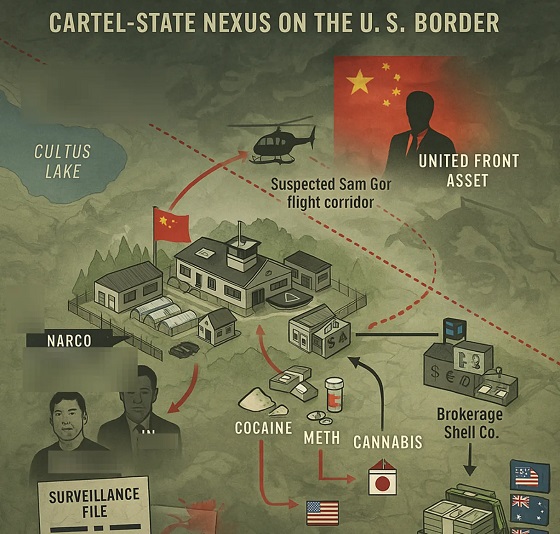illegal immigration
A blanket amnesty for illegal migrants would be a disaster for Canada: David L. Thomas for Inside Policy
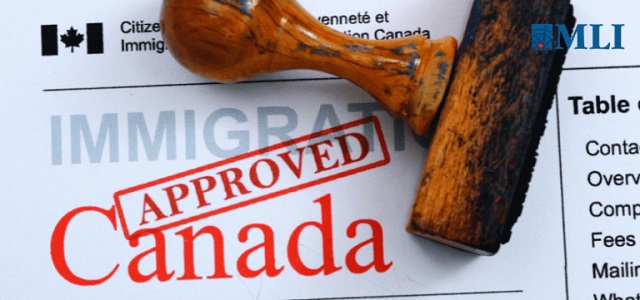
From the Macdonald Laurier Institute
By David L. Thomas
The prospect of a general amnesty for illegals in Canada will be the final straw. How can there be any shred of integrity left in our immigration system if we reward those who broke the rules?
The Liberal government’s proposal to grant a pathway to citizenship to “undocumented” people who are in Canada illegally is a risky strategy and likely to backfire. It will be seen as an open invitation to billions of people around the world to come here, break our immigration laws, and eventually be rewarded for it.
In my years as an immigration lawyer, I met countless people who dreamed of one day possessing a Canadian passport. Holding one would unlock a world of opportunity in Canada. But it also has another attractive feature: Canadian passport-holders can travel visa-free to 188 countries. When I began my legal career, we used to say there were only about 20 “good passports” in the world – passports that allowed unrestricted travel abroad and a good standard of living in the home country. Given general rises in prosperity and geopolitical progress (think the fall of the Berlin Wall), I would argue the number of “good passports” has risen to about 45.
Of course, that means there are still around 155 “not-so-good passports” issued by other countries, where the majority of the world’s population happens to reside. Given that only a few countries actively promote immigration (Canada leads in this respect, followed closely by Australia and New Zealand) it is easy to see why Canadian citizenship is in such high demand.
Some activists argue there should be no borders – that “no one is illegal.” They are grossly underestimating the demand. If a border-free world popped into existence tomorrow, many estimated 250 million people would immediately choose to relocate. Some have put that number as high as 750 million. I believe these estimates are outdated and perhaps naïve. Surely the number today would be in the billions.
A recent survey suggested that 69 million Chinese would like to move to Canada, if they could. The same survey showed 137 million Chinese are considering moving to the US (Canada would be their second choice). Another survey indicated that almost 75 percent of Indians are seeking to emigrate, and 35 percent are actively working towards it (India has a population of 1.4 billion). A Gallup World Poll in 2017 showed a growing worldwide trend in the desire to relocate to a new country. In Sub-Saharan Africa, with a population of 1.24 billion, 33 percent indicated a wish to emigrate. In Nigeria alone, 48 percent indicated a desire to emigrate permanently (the population of Nigeria is 229 million).
Prior to 2017, Canada – surrounded by three oceans and neighbouring the United States – had reasonable control of its borders. Illegal border crossings were not that common. Some might recall in 1999 when four rusty ships washed ashore on western Vancouver Island, having transported 599 illegal migrants from Fujian, China. The federal government responded quickly – deporting 330 migrants and granting three dozen refugee status. As for the rest, well, they just disappeared.
Even though more than two hundred migrants slipped through the cracks during that 1999 event, that seems like a tremendous success compared to the open invitation Prime Minister Justin Trudeau made to the world in an infamous January 2017 tweet. In response to the inauguration of President Donald Trump and his promise to clamp down on illegal immigration, Trudeau posted on Twitter: “To those fleeing persecution, terror & war, Canadians will welcome you, regardless of your faith. Diversity is our strength #WelcomeToCanada.”
Many undocumented migrants in America saw this as an open invitation to simply walk across our border. By the end of 2018, more than 50,000 people had crossed into Canada illegally, most of them through Roxham Road in Quebec, at the border with upstate New York.
In 2019, a CBC reporter made these observations about the Roxham Road crossing:
But the majority of those who come here to Plattsburgh, N.Y., by bus, train or plane have spent little time in the U.S., arriving on tourist visas with the intent of treading the footpath to Canada. When CBC News visited the crossing recently, in one day we met families and single travellers from Pakistan, Turkey, Yemen, Lebanon, Nigeria, Sri Lanka, Eritrea, as well as a Palestinian family from the occupied territories. Some arrived with what appeared to be fresh baggage tags from overseas flights into New York. Others had made their way north from Mexico, South and Central America.
In 2017, Haitians who had overstayed their 2010 earthquake disaster-related visas in the United States formed the largest group of migrants illegally entering Canada. Trump had specially targeted this group, although, in the end, his administration made few deportations. By 2018, however, nearly 75 percent of illegal migrants at Roxham Road had freshly arrived from Nigeria. They had obtained valid US visitor visas in Nigeria, but it was widely believed to be part of a scheme in which the visa recipients understood they had to immediately leave the US by walking into Canada.
Trudeau could have easily stopped this charade at any time by amending the Safe Third County Agreement with the US (which he eventually did in 2023). But at the time, he instead dispatched then Immigration Minister Ahmed Hussen to Nigeria to try to persuade US officials to stop issuing so many dubious visas.
Even though authorities have since closed Roxham Road and similar illegal crossing points, Canadians are still feeling the repercussions of this open-border policy – and will be for years. There are still about 7,300 refugee claimants being housed in 36 hotels, mostly in southern Ontario, who on average each cost Canadian taxpayers about $208 per day. The total price tag for Trudeau’s 2017 tweet is already in the billions of dollars and ongoing.
Without question, surely some of the 113,000 people who walked into Canada since 2017 are legitimate UN Convention-definition refugees. Equally clear is that many are economic migrants, and others are just queue-jumpers looking for an easy way in. Moreover, if you were an undocumented person in the US with criminal charges outstanding, a swift exit into Canada across Roxham Road would seem extremely attractive. You could arrive without identification and make up a new identity. Why not? We have no idea how many criminals or terrorists may have walked in.
In the 2000s, when I was still actively practicing immigration law, there were many Mexican citizens working illegally in Vancouver. It was the same in Toronto. Some years earlier, the Liberal government had dropped the visitor visa requirement for Mexican citizens. It resulted in a flood of people over-staying their lawful period of admission as well as a deluge of Mexican refugee claims made within Canada. In 2009, Prime Minister Stephen Harper put an end to the madness and required Mexican citizens to apply for visitor visas.
Canada has established, objective standards in place for determining which countries should be exempt from our visitor visa requirement. In 2016, Trudeau hosted Mexican President Enrique Nieto in Ottawa. Nieto urged Trudeau to remove the visitor visa requirement for Mexican citizens. Trudeau ignored the objective standards and promised Nieto he would do so. (This resulted in immediate protests from Bulgaria and Romania, who also didn’t meet our standards. To avoid controversy, Trudeau removed their visa requirements as well.)
Unfortunately, removing the visitor visa requirement for Mexicans turned out to (again) be an unmitigated disaster. For instance, in 2023, there were more than 25,000 inland refugee claims from Mexico alone. Fast forward to 2024, and Trudeau had no choice but to reverse his decision – since February of this year, most Mexicans are required to apply for a visitor visa.
Canada also has a poor record for removing failed refugee claimants as well as non-Canadians who have committed crimes in Canada. Most people who have been issued deportation letters since 2016 are still in Canada. Moreover, if Donald Trump is elected this fall, he has promised a massive deportation effort to deal with illegal immigrants in the US, many of whom may be tempted to illegally escape into Canada.
Marc Miller, the current immigration minister, estimates there are between 300,000 and 600,000 people living illegally in Canada –- but even he’s not sure. Unlike many other countries, Canada does not track the departure of non-Canadians. Therefore, it is quite easy for someone whose visitor visa, study permit, or work permit has expired to simply remain in Canada. No one will be knocking on their door because they just aren’t on the radar.
We could begin tracking departures as other countries do, or we could start seriously enforcing our deportation orders. However, this seems to be too much effort. The federal government is apparently attracted to a much easier solution: just let them stay.
Lobby groups like the Migrant Rights Network (MRN) are pressuring the government to offer an amnesty for all “undocumented” migrants in Canada, and to grant permanent status to their family members upon arrival in the future. At a recent press conference calling for amnesty, the MRN estimated that between 20,000 and 500,000 people without immigration status are currently living in Canada.
Since 2017, the City of Toronto has celebrated “Undocumented Residents Day” and this year the City hosted a forum where activists spoke up to encourage the federal government to grant permanent residence to people living in Canada without authorization. Some of the speakers blamed “white supremacy” for shortcomings in our legal immigration system. However, the majority of legal immigrants to Canada have been non-white in every year since 1971.
Shortly after the 2021 federal election, Trudeau issued a mandate letter for his new Immigration Minister, Sean Fraser, that ordered him to explore an amnesty solution. More recently, Minister Miller commented, “There is no doubt that we have made a conscious decision to be an open country.” In May, Trudeau told reporters, “People who aren’t here regularly need to be supported and taken care of. There needs to be either a pathway towards regularization and citizenship, which I know the (immigration) minister is working on.” These recent comments by Trudeau and Miller suggest the Liberals are seriously considering an announcement of an amnesty in the near future.
Until recently, most Canadians were in favour of Canada’s immigration system. The reality today is that most Canadians feel that our immigration levels are too high, with the highest anti-immigration sentiment in decades. Even 42 percent of recent immigrants feel the numbers are excessive. Recently, the Bank of Canada also sounded the alarm, blaming record levels of immigration for driving up the cost of housing.
It is reckless, and possibly, dangerous for the federal government to ignore these warnings. Without broad public support, Canada’s immigration system is doomed. It also risks heightened levels of racism and xenophobia once the broad support is gone.
The prospect of a general amnesty for illegals in Canada will be the final straw. How can there be any shred of integrity left in our immigration system if we reward those who broke the rules? I spoke recently to a retired government immigration program manager who concurs: “An amnesty is pure madness,” he said, “and crushing in its unfairness to all those who have played by the rules.”
What message would a general amnesty send to legal migrants to our country? Why would others go through normal channels to come here? Would an amnesty now undermine future deportation orders? Why would failed refugee claimants or convicted criminals depart Canada? If Canada grants amnesty once, surely Canada will do it again, once the number of illegals bloats again.
If there is any doubt about that, consider the current illegal immigration crisis gripping the United States. In 1986, President Ronald Reagan signed a sweeping immigration reform bill into law. Sold as a crackdown on illegal immigration, it called for tighter security at the Mexican border, with employers facing strict penalties for hiring undocumented workers. As part of the bill, the US government offered amnesty with a path to permanent status to about 3 million undocumented migrants. Supposedly a one-time amnesty, it was to be followed up with strict border controls and other measures to make sure the number of illegals never grew to such a large number again.
Reagan’s amnesty plan was anything but a panacea. Rather, it acted as an invitation to billions of would-be migrants to come to America and break its immigration laws. Although it’s impossible to know the exact number, some estimate the number of illegals in the US today to be around 22 million. Canada is on the cusp of making the very same mistake.
David L. Thomas is a lawyer and mediator in British Columbia and a senior fellow with the Macdonald-Laurier Institute. From 2014–2021, he served as the chairperson of the Canadian Human Rights Tribunal in Ottawa.
illegal immigration
New program offers illegals $1,000 and flights to self-deport

 MxM News
MxM News
Quick Hit:
The Trump admin will now cover the cost of flights for illegal immigrants who voluntarily leave the U.S. and provide them with a $1,000 stipend after their departure is confirmed. DHS estimates the move will save taxpayers 70% compared to traditional arrest and deportation efforts.
Key Details:
-
According to Fox News’s Bill Melugin, DHS will announce a new policy that funds commercial airfare for illegal aliens who register to self-deport through the CBP Home app and follow through on leaving the country.
-
Once an individual’s exit is confirmed through the app, they will receive a $1,000 stipend. DHS says this approach reduces the average cost per removal from $17,000 to just $4,500.
-
Homeland Security Secretary Kristi Noem emphasized that this method avoids arrest and detention, calling it the “safest option” for both law enforcement and the migrants involved.
If you are here illegally, self-deportation is the best, safest and most cost effective way to leave the United States to avoid arrest.
DHS is now offering illegal aliens financial travel assistance and a stipend to return to their home country through the CBP Home App.
This is… pic.twitter.com/2f02wLWQi5
— Secretary Kristi Noem (@Sec_Noem) May 5, 2025
Diving Deeper:
The Department of Homeland Security under the Trump administration is rolling out a new initiative aimed at encouraging voluntary self-deportation among illegal immigrants by offering financial incentives and logistical assistance. As first reported by Fox News correspondent Bill Melugin, the department will now pay for the commercial airfare of those who choose to leave the country voluntarily and will provide a $1,000 stipend once their departure is verified.
A DHS spokesperson told Fox News the program is expected to reduce deportation costs by over 70%, cutting the average expense from more than $17,000 per removal to approximately $4,500. “This will be safer for ICE and preserve their resources,” the department said, highlighting the policy’s benefits for both enforcement and fiscal responsibility.
Illegal immigrants who wish to participate must register via the CBP Home app and notify authorities of their intent to leave. Once they do so, they will be deprioritized for ICE enforcement and maintain the possibility of legally returning to the United States in the future. According to DHS’s official website, participants in the program may be eligible for financial assistance, help with travel documents, and logistical coordination to arrange departure within roughly three weeks of approval.
Homeland Security Secretary Kristi Noem praised the program, saying: “If you are here illegally, self-deportation is the best, safest, and most cost-effective way to leave the United States to avoid arrest,” she said. “This is the safest option for our law enforcement, aliens, and is a 70% savings for US taxpayers. Download the CBP Home App TODAY and self-deport.”
Daily Caller
DOJ Releases Dossier Of Deported Maryland Man’s Alleged MS-13 Gang Ties


From the Daily Caller News Foundation
By Katelynn Richardson
The Department of Justice (DOJ) released documents Wednesday demonstrating Kilmar Armando Abrego Garcia’s membership in the MS-13 gang.
Abrego Garcia’s police interview, immigration court rulings and Department of Homeland Security (DHS) deportable/inadmissible alien record highlighting his membership in the gang, which he has disputed in court, are included in the release.
In a December 2019 decision, the Board of Immigration Appeals dismissed Abrego Garcia’s challenge to an immigration judge’s factual finding that he is “a verified member of MS-13.”
The board found the immigration judge “appropriately considered allegations of gang affiliation against the respondent in determining that he has not demonstrated that he is not a danger to property or persons.”
Officers found Abrego Garcia loitering in a Home Depot parking lot on March 28, 2019, wearing “a Chicago Bulls hat and a hoodie with rolls of money covering the eyes, ears and mouth of the presidents on the separate denominations,” the initial Prince George’s County Police Department Gang Field Interview Sheet states.
“Wearing the Chicago Bulls hat represents that they are a member in good standing with the MS-13,” the document states. “Officers contacted a past proven and reliable source of information, who advised Kilmar Armando ABREGO-GARCIA is an active member of MS-13 with the Westerns clique. The confidential source further advised that he is the rank of ‘Chequeo’ with the moniker of ‘Chele.’”
The administration became embroiled in a legal dispute after Abrego Garcia, who entered the country illegally in 2011, was deported in March to El Salvador as a result of an error. In court records, they argued Abrego Garcia could not “relitigate the finding that he is a danger to the community.”
A lower court ordered his return, but the Supreme Court required it to clarify the order and directed the administration to “facilitate” Abrego Garcia’s release.
The Department of Justice (DOJ) indicated Wednesday that it would appeal the amended order Judge Paula Xinis issued which directed the government to “take all available steps to facilitate the return of Abrego Garcia to the United States as soon as possible.”
During a Monday meeting with President Donald Trump, El Salvadoran President Nayib Bukele said he would not “smuggle” a terrorist into the U.S.
The Department of Homeland Security (DHS) also released court filings Wednesday showing Abrego Garcia’s wife requested a domestic violence restraining order against him.
-
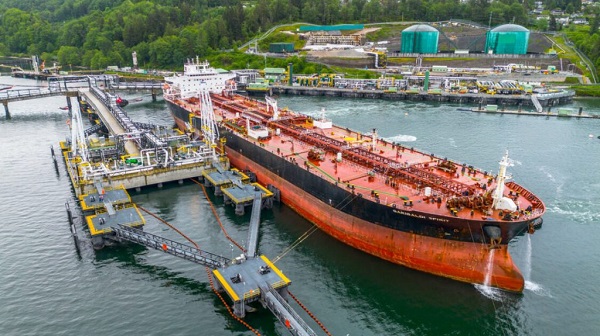
 Energy2 days ago
Energy2 days agoOil tankers in Vancouver are loading plenty, but they can load even more
-
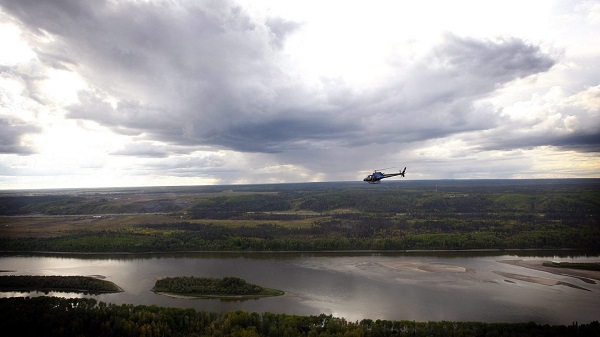
 Alberta2 days ago
Alberta2 days agoEnergy projects occupy less than three per cent of Alberta’s oil sands region, report says
-

 Alberta2 days ago
Alberta2 days agoCharges laid in record cocaine seizure
-

 Energy2 days ago
Energy2 days agoCarney’s energy superpower rhetoric falls flat without policy certainty
-

 conflict2 days ago
conflict2 days agoWATCH: U.S. ending bombing campaign on Yemeni militant group
-
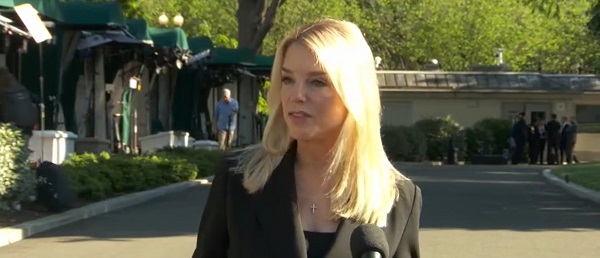
 Crime2 days ago
Crime2 days agoPam Bondi Reveals What The Holdup Is With Epstein File Release
-

 Business1 day ago
Business1 day agoInnovative Solutions Like This Plan To Provide Power For Data Centres Will Drive Natural Gas Demand For Decades
-

 Business1 day ago
Business1 day agoEPA to shut down “Energy Star” program

